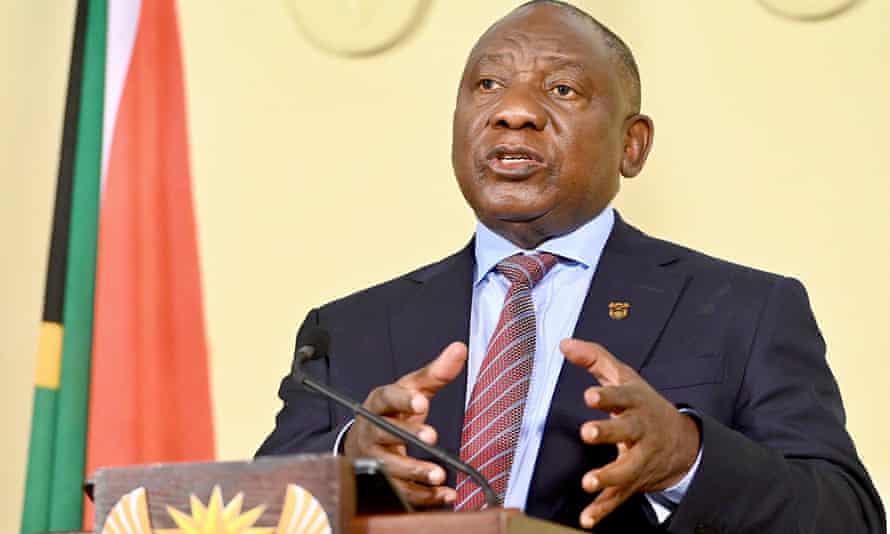The health system in Johannesburg, South Africa’s biggest city, is being overwhelmed by a massive wave of infections driven by the Delta variant, the winter in the southern hemisphere and a faltering vaccine campaign.
The new variant is now dominant in Africa’s most developed country, where the official death toll is now more than 60,000, though excess mortality statistics suggest more than 170,000may have died from Covid.
Across Africa, the Delta variant is fuelling an aggressive third wave of infections, with case numbers climbing faster than all earlier peaks, according to the World Health Organization.
WHO experts warned last week that infections across Africa have increased for six consecutive weeks, up by 25% last week, reaching 202,000 positive cases. South Africa accounted for more than half of Africa’s cases last week, although it is one of the few countries where testing is extensive. On 1 July alone more than 21,000 cases were registered.
Authorities in South Africa have been unable to stem the spread of the new variant, only moving to impose new restrictions after a massive wave of infections ravaged the country’s economic heartland.
President Cyril Ramaphosa said last week that the country’s health system was “buckling” as he imposed a two-week ban on all gatherings, indoors and outdoors, along with the sale of alcohol and travel to or from the worst hit areas of the country, such as Gauteng, its most populous and economically productive province. An extended curfew was also imposed, and schools shut early for holidays.
“We have overcome two decisive waves but now we have a new hill to climb, a great challenge, a massive resurgence of infections… a devastating wave,” he said.
Anger and frustration have grown after repeated promises to accelerate the faltering vaccination campaign have been broken. Only three million jabs have been delivered to a population of 60 million. Acting health minister Mmamoloko Kubayi-Ngubane said that delivery of vaccines would gather pace in coming weeks, with all those over 50, as well as police, teachers and soldiers, being targeted.

However, a series of corruption scandals involving Covid spending has undermined trust in the government. The health minister has been suspended pending an investigation into corruption allegations.
The surge in infections has laid bare the weakness of the public health services, with hospitals overflowing and shortages of oxygen, but above all a lack of trained personnel. The much-publicised arrival of military doctors has been described by health practitioners as “a very late drop in a very big ocean”.
Last Thursday the South African Medical Association threatened to take the government to court because scores of new junior doctors cannot find placements despite staff shortages.
The vaccine drive has been halted over weekends and public holidays to rest health workers but also because there is no budget for overtime, officials have admitted.
In many parts of the country volunteer organisations are filling gaps. Some patients in Johannesburg who have failed to find a bed on a public ward are being cared for at a makeshift Covid ward set up by a Muslim charity in the city.
“We don’t see dead people. The funeral services see dead people. We see death. That’s the difference. We see death happening. We try to get to patients on time but unfortunately we can’t always do that,” said Anees Kara, a volunteer doctor.
Studies of blood donors released on Friday have revealed that almost half of the population may have already been infected by the virus, though the third wave appears set to be the worst yet.
The WHO has said the speed and scale of Africa’s third wave is unprecedented.
“The rampant spread of more contagious variants pushes the threat to Africa up to a whole new level. More transmission means more serious illness and more deaths, so everyone must act now and boost prevention measures to stop an emergency becoming a tragedy,” said Dr Matshidiso Moeti, WHO’s regional director for Africa.
Eight vaccines have been approved for the WHO emergency-use listing, but shipments to Africa have, in effect, dried up. “While supply challenges grind on, dose-sharing can help plug the gap. We are grateful for the pledges made by our international partners, but we need urgent action on allocations. Africa must not be left languishing in the throes of its worst wave yet,” said Moeti.
Only 15 million people – 1.2% of the African population – are fully vaccinated.
from WordPress https://ift.tt/3heQUyg
via IFTTT

No comments:
Post a Comment